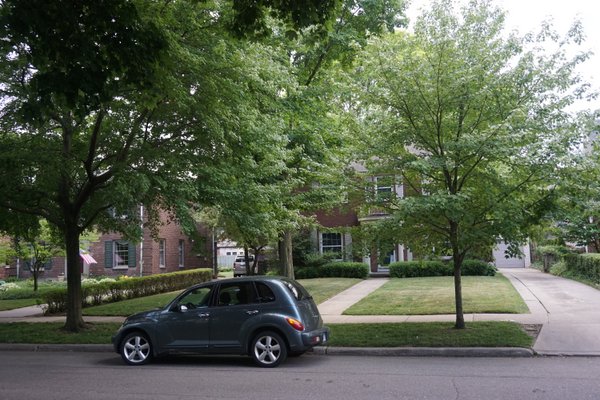Location Words in Chinese (Part Two) Posted by sasha on Jun 29, 2016 in Uncategorized
In case you missed the first post about location words in Chinese, go back and read that before continuing. Hopefully, those of you who did read it also tried the practice. Here are the answers for those before we get started:
1. Where’s my book? On the sofa.
我的书在哪里? 在沙发上
wǒ de shū zài nǎ lǐ? zài shā fā shàng
2. Where are they? In the car.
他们在哪里? 在汽车里面
tā men zài nǎ lǐ? zài qì chē lǐ miàn
3. Where’s the post office? Next to the bank.
邮局在哪里? 在银行旁边
yóu jú zài nǎ lǐ? zài yín háng páng biān
4. Where’s the dog? Outside.
狗在哪里? 在外面
gǒu zài nǎ lǐ? zài wài miàn
5. Where’s Tianjin? South of Beijing.
天津在哪里? 在北京南边
tiān jīn zài nǎ lǐ? zài běi jīng nán bian
How Location Words Are Used

With my students in class.
In Chinese, location words may be used as a subject, object, attributive, or center-word. Let’s take a look at an example of each, starting with the location word being used as the subject or object:
In the school there are many students.
学校里面有很多学生
xué xiào lǐ miàn yǒu hěn duō xué shēng
The restaurant is next to the supermarket.
饭店在超市旁边
fàn diàn zài chāo shì páng biān
How do you think you could flip these sentences around? What I mean is, try to make the location word the object in the first one and make it the subject in the second. Take a minute and try it before looking down at the answer!
There are many students in the school.
有很多学生在学校里面
yǒu hěn duō xué shēng zài xué xiào lǐ miàn
Next to the supermarket there’s a restaurant.
超市旁边有饭店
chāo shì páng biān yǒu fàn diàn
Either way is correct, but it’s always good to learn both! Now let’s take a look at some other examples where we can use the location word as an attributive or as a center-word:
the car outside
外面的汽车
wài miàn de qì chē
outside of the car
汽车(的)外面
qì chē de wài miàn

Do you mean the car outside, or outside of the car?
Can you notice the differences between the two examples above? In the first one where the location word is used as an attributive, you must add the character 的. This example means “the car which is outside.” In the second one, where the location word is used as a center-word, 的 is optional and is more often omitted. A few small changes, but a big difference in meaning – you wouldn’t want to talk about “the car that’s outside” when you’re really trying to say that something is “outside of the car.” Take a look at another example to better understand the difference:
the back of the room
房间(的)后边
fáng jiān (de) hòu bian
the room in the back/the room behind
后边的房间
hòu bian de fáng jiān
Look at how versatile location words are! You can use them in so many ways. Just keep practicing them and pay attention to how they’re used when you talk to people, watch TV, or read.
Simplification
Chinese may seem like a complicated language, but people love simplifying things. Chinese people love omitting characters to make shorter, more succinct phrases. This happens very often when dealing with location words. As I mentioned in the first post, the 面/边 placed at the end is very often dropped. Also, as you saw in some of the examples above, 的 is often dropped as well. Let’s look at some examples of how we can simplify the location:
桌子的上边 – 桌子上
zhuō zi de shàng bian – zhuō zi shàng
(on the table)
床的下面 – 床下
chuáng de xià miàn – chuáng xià
(under the bed)
背包的俩面 – 背包里
bèi bāo de liǎ miàn – bèi bāo lǐ
(in the backpack)
银行的钱边 – 银行前
yín háng de qián biān – yín háng qián
(in front of the bank)
门口的北边 - 门口北
mén kǒu de běi bian – mén kǒu běi
(north of the entrance)
It should be noted that you don’t simplify a few location words – 左 (left) and 右 (right) both need to have either 面/边 attached, 对面 (opposite) and 旁边 (next to) always show up just like that, and 中间 (in the middle) is a loner and a special case.
Wow – that’s a lot of grammar for a few days! Hopefully now you have a better idea of how to use location words in Chinese. It may seem complicated, but once you learn the basics and start using them, you’ll realize it’s really pretty easy. The fact that you can almost always simplify things is nice, and doing so doesn’t make you sound lazy; rather, it makes you sound like more of a fluent speaker because that’s how people really talk! So get out there, speak Chinese, and describe locations!

Build vocabulary, practice pronunciation, and more with Transparent Language Online. Available anytime, anywhere, on any device.
About the Author: sasha
Sasha is an English teacher, writer, photographer, and videographer from the great state of Michigan. Upon graduating from Michigan State University, he moved to China and spent 5+ years living, working, studying, and traveling there. He also studied Indonesian Language & Culture in Bali for a year. He and his wife run the travel blog Grateful Gypsies, and they're currently trying the digital nomad lifestyle across Latin America.




Leave a comment: